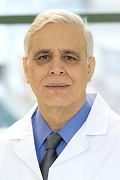
A new center offers diagnosis and personalized treatments for cardiac amyloidosis.
Amyloidosis is sometimes described as mysterious. Caused by an abnormal protein that accumulates in organs such as the heart, kidneys, nerves or liver, amyloidosis is both rare and often misdiagnosed—or undiagnosed.
That’s partly because symptoms of amyloidosis can be subtle and often involve multiple organs at once. Symptoms frequently overlap with those of other conditions, including heart failure, renal failure, carpal tunnel syndrome and neuropathy.
But one aspect of amyloidosis is not a mystery: Variations of the disease can be fatal—often within years or even months—if left untreated.
Although scientists have long known about amyloidosis, a range of diagnostic tools and treatments have recently been developed as researchers increasingly unravel the disease’s protein puzzles. Now Robert Wood Johnson University Hospital (RWJUH) in New Brunswick and Rutgers Robert Wood Johnson Medical School (RWJMS) have established the Cardiac Amyloidosis and Cardiomyopathy Center. Located at RWJUH, the multidisciplinary center seeks to diagnose patients with amyloid conditions earlier and treat them more effectively.
World-Class Expertise
Patients in the Cardiac Amyloidosis and Cardiomyopathy Center at RWJUH will benefit from specialists in a wide range of disciplines, including cardiology, neurology, hematology, nephrology, pathology and bone marrow transplantation.
Clinical teams will work to identify different forms of the disease and develop an effective, personalized treatment plan for each patient.

Sabahat Bokhari, MD, an internationally recognized amyloidosis expert, will serve as director of the center, the first program of its kind in New Jersey. Dr. Bokhari is also a professor in the Division of Cardiovascular Disease and Hypertension at RWJMS and will be the Director of Advanced Cardiac Imaging at RWJUH as well as Program Director of the Advanced Cardiac Imaging Fellowship Program.
Dr. Bokhari has served as Director of Nuclear Cardiology and Advanced Cardiac Imaging at the New York Presbyterian Hospital/Columbia University Medical Center and at Lehigh Valley Heart and Vascular Institute, in Pennsylvania. He has trained candidates from top-tier cardiology programs throughout the country.
“Amyloidosis can be a serious medical condition if it is not diagnosed properly,” Dr. Bokhari says. “Our center combines expertise across a broad range of disciplines with the most advanced cardiac imaging capabilities to identify these conditions much earlier and develop individual treatment plans that will give patients the best chance to live longer, healthier, more active lives.”
Advanced Diagnosis
Dr. Bokhari has made significant contributions to the proper diagnosis of amyloidosis.
He pioneered the development of a noninvasive imaging method called technetium-99m pyrophosphate scintigraphy (PYP) imaging, which is used worldwide and is recommended by professional medical organizations such as the American College of Cardiology, the American Heart Association and the American Society of Nuclear Cardiology for evaluating a form of the disease called cardiac transthyretin amyloidosis.
A physician who suspects amyloidosis will monitor a patient closely with several screening tests, including a PYP scan.

The scan uses a radioactive form of a substance called pyrophosphate, which is injected into an arm vein. Patients then undergo a CT (computed tomography) scan to identify telltale abnormalities that indicate cardiac amyloidosis. The scan can even tell what form of amyloidosis an individual may have.
“Dr. Bokhari brings a wealth of knowledge in this field and the capabilities to dramatically impact the health of people in New Jersey and the region,” says Partho Sengupta, MD, FACC, Chief of the Division of Cardiovascular Disease and Hypertension at RWJMS and Chief of Cardiology at RWJUH. “A center like this can only exist at an academic medical center where there is broad expertise across many disciplines that can be convened to benefit patients. Dr. Bokhari is enabling that for our state and beyond, and will advance our vision for academic medicine enabled by technology and collaboration.”
What Is Amyloidosis?
Amyloidosis is a rare disease in which an abnormal protein accumulates in vital organs, causing significant damage. In the heart, for example, it stiffens walls, making it more difficult for blood to be pumped through the body.
Amyloidosis can have a range of effects depending on how it affects different organs, which can include the heart, kidneys, nerves and liver. Amyloid-related heart problems can become life-threatening.
In the heart, a reduced ability to fill chambers with blood and pump blood with each beat can cause shortness of breath. Other possible symptoms include an irregular heartbeat, severe fatigue and swelling in the legs and ankles. If amyloidosis affects the heart’s electrical system, it can cause heart rhythm problems.
An Advanced Technology Gauges Heart Damage
Robert Wood Johnson University Hospital (RWJUH) Somerset now offers advanced cardiac diagnostic imaging for the early detection of heart disease and the evaluation of heart damage.
Called cardiac PET/CT (positron emission tomography/computed tomography), the technology is a type of nuclear medicine imaging that merges two advanced scanner technologies into one exam. The combined technology creates clear 3D images of the heart that provide information about both the structure and function of cells and tissues, allowing clinicians to distinguish between healthy and damaged heart muscle.
Among other applications, cardiac PET/CT is used to diagnose cardiac amyloidosis, a rare and potentially fatal condition that involves the accumulation of abnormal proteins in the heart.
RWJUH Somerset recently completed the final phase of a five-year Cardiology Services expansion project. In addition to cardiac PET/CT, the hospital’s cardiac diagnostic testing services include angiograms, CT scans, single-photon emission computed tomography (SPECT) scans, echocardiograms and ultrasounds.
Learn more about Cardiac Amyloidosis and the Cardiac Amyloidosis and Cardiomyopathy Center at Robert Wood Johnson University Hospital.
 View full issues of Healthy Together magazine by New Jersey region:
View full issues of Healthy Together magazine by New Jersey region: